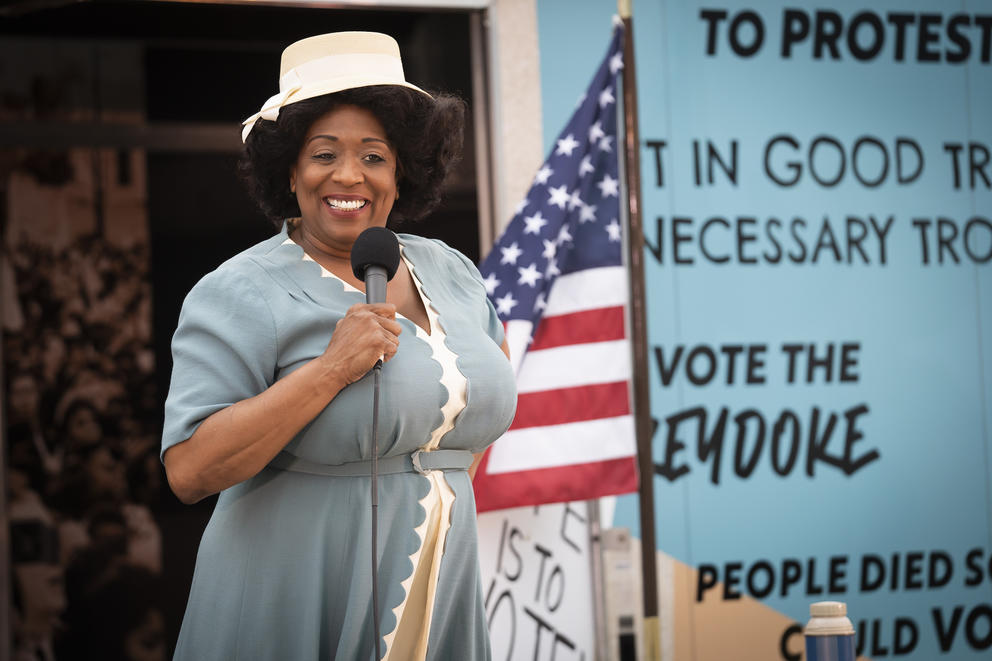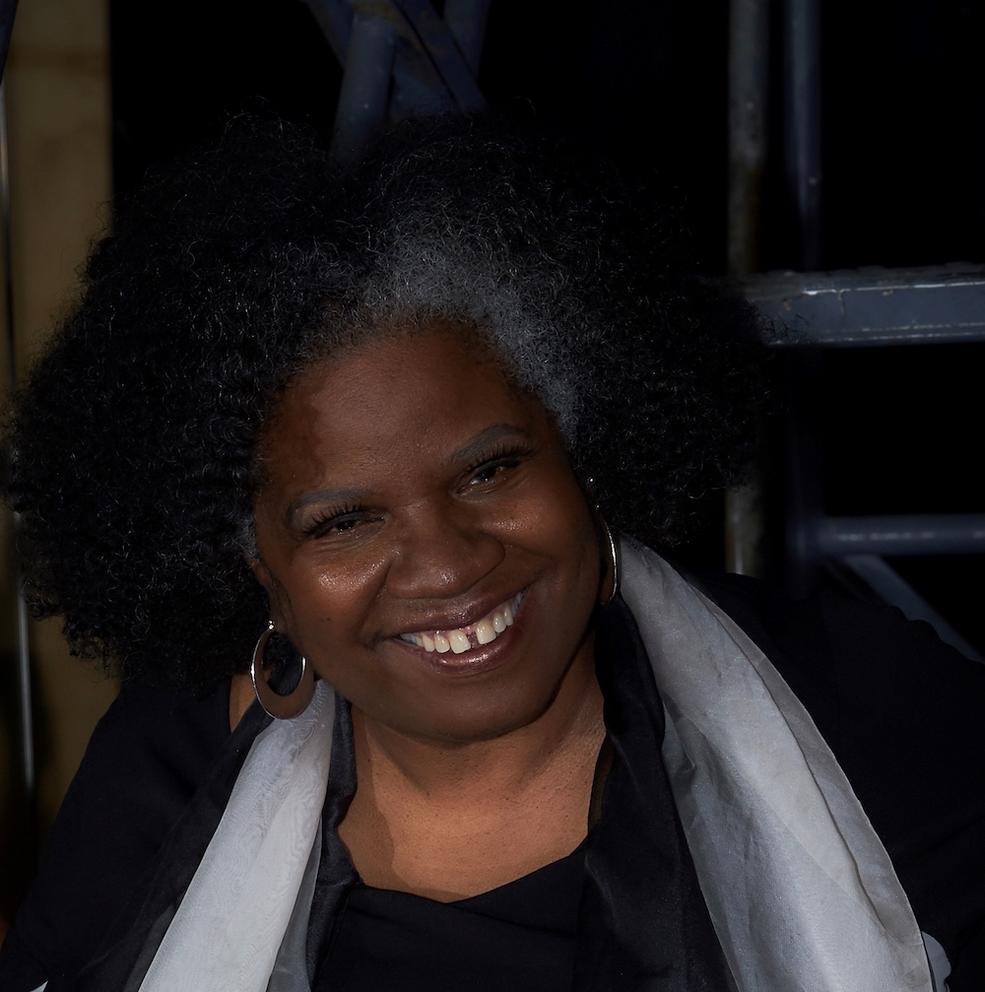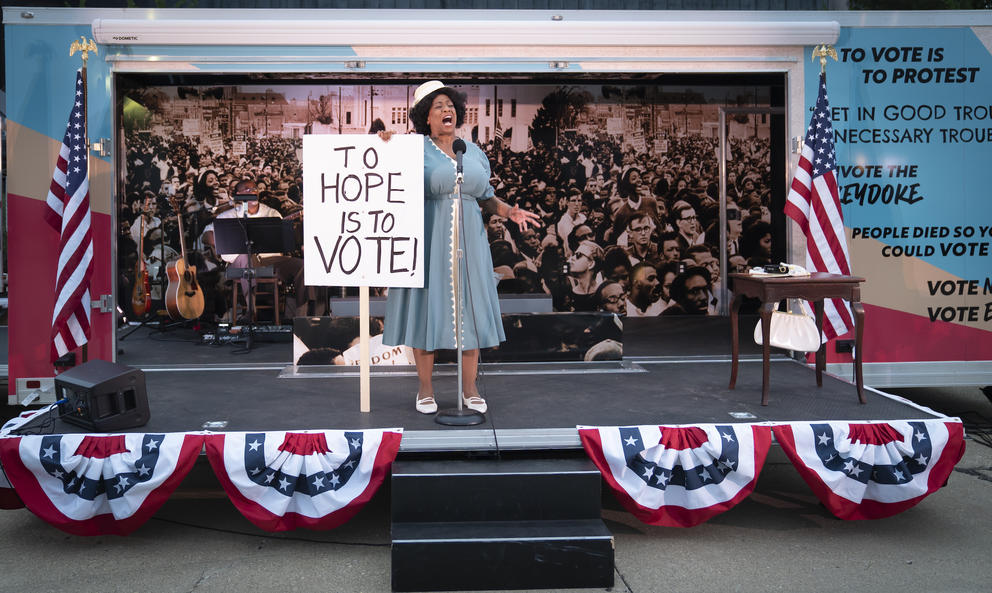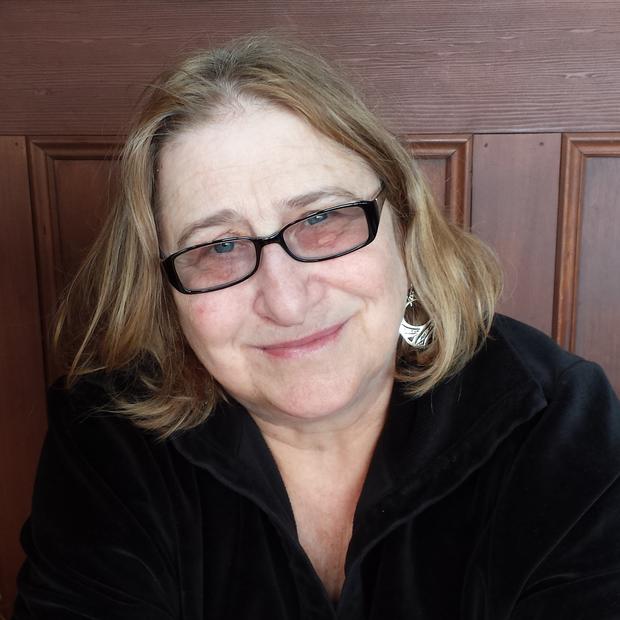Take Cheryl L. West. While there’s no telling precisely when we’ll get to see the fruit of her labors, that doesn’t mean the highly regarded local playwright hasn’t been busy behind the scenes, writing, revising and workshopping a tantalizing array of projects. She’s working on scripts commissioned by the Seattle Repertory Theatre, the Oregon Shakespeare Festival and other companies, and even managed to get one produced last summer — outside, in the public parks of Chicago and Washington, D.C.
West’s work is well known to Seattle Rep patrons. In late 2019, her musical play Shout Sister! Shout! debuted at the theater, raising the roof as it related the story of innovative gospel artist Sister Rosetta Tharpe. And the theatre has staged additional works by the prolific West, including Pullman Porter Blues and Holiday Heart.
Most recently, Seattle Rep invited West to kick off a new pandemic-inspired series “Plays in Process,” which aims to whet the appetite of grounded theater lovers with Zoom presentations about forthcoming productions.
The format is simple. Artistic Director Braden Abraham interviews authors, directors and actors about the future shows Seattle Rep has commissioned and plans to produce. It’s a way to offer a glimpse into the creative process of theatrical practitioners. Coming up in the series are discussions about a new adaptation of Shakespeare’s Hamlet and a chat with director Cary Perloff and actors Uma Thurman and David Strathairn about an upcoming production of Henrik Ibsen’s Ghosts.
But it is apropos that the first episode of Plays in Process featured West and several of her collaborators discussing their creation of a timely new piece. Fannie: The Music and Life of Fannie Lou Hamer is a bio-play about the fearless Mississippi sharecropper turned voting rights activist, whose impassioned eloquence at the 1964 Democratic Convention served as a national wake-up call.
Before an audience of several hundred watchers on Seattle Rep’s YouTube channel, West shared why she chose to write a play about Hamer, a work co-commissioned by the Rep and the Goodman Theatre of Chicago. “I’ve always been interested in unsung heroes, people who are no longer with us but have so much to teach us,” she noted. E. Faye Butler, cast as Hamer in the one-actor show, added, “Cheryl always speaks for the lone voices, the women’s voices. I knew who [Hamer] was, but when I was [working] with Cheryl, that’s when she came alive for me.”
West recalled a major inspiration: the late Hamer’s compelling public speeches and her leadership in Freedom Summer. During that pivotal 1964 campaign, some 1,500 volunteers traveled to Mississippi and braved harassment, at times deadly violence and arrest to help register Black residents to vote after they had long been denied the right.
That summer, Hamer helped organize the upstart Mississippi Freedom Democratic Party. During the 1964 Democratic Convention she demanded, in a searing and still relevant speech about racial injustice and voter suppression, that their delegates be seated along with the state’s all-white “official” delegation.
West is dedicating her tribute to Hamer (who suffered poverty, forced sterilization and life-altering jail beatings) to her own mother and other women in her family who hailed from Mississippi. “I know that world,” West says. “Those women had a way of protesting … a kind of quiet way” — the only way they could in the Jim Crow South.
In the online conversation with Abraham, West joined with director Henry Godinez, Butler and musical director Felton Offard to describe how they seized the preelection moment in 2020 to bring an abridged 40-minute version of her play (Fannie Lou Hamer, Speak on It) to parks in Black neighborhoods of Chicago and Washington, D.C. Audience members maintained social distancing, watching from their porches and windows, and the free performances doubled as voter registration drives.
The full-length version, Fannie: The Music and Life of Fannie Lou Hamer, will begin a run this month on the outdoor stage at the Asolo Repertory Theatre in Sarasota, Florida. Abraham says he plans to include it in Seattle Rep’s indoor season when the theater reopens, and hopes to present Emerald City, West’s musical about local homelessness, soon as well.
After the initial Plays in Process event, I caught up with West by phone to discuss the creative process the 55-year old Chicago native has developed since turning from a career in social work to a full-time focus on writing for theater and television — and how her process has changed during the COVID-19 epidemic.
West is a major multitasker, in the sense that her daily to-do list usually includes work on several different plays. While refining the Hamer play and sketching in Emerald City, she is also in process on an Oregon Shakespeare Festival script, Lady Jazz, which, she noted, is inspired by The Sweethearts of Rhythm, an all-women jazz band of the 1940s. “It’s totally fiction,” she says, “but with some elements of what women were going through in that period.”
Also, for Seattle Children’s Theatre, she’s currently adapting The Watsons Go to Birmingham, based on a book for young readers about a family trip to Alabama in the Civil Rights Era.
Since many of her plays depict real-life incidents, events and people, West credits her dramaturge (literary editor), Christine Sumption, with supplying valuable background research. “Chris will give me, like, a binder of material,” West says. “For Fannie, she’d pull lyrics of civil rights songs, describe civil rights laws, lots of things, so that I have all this great material organized in one place.”
A self-described morning person, West says she writes early in the day, “when I feel most creative. I’ll eventually do an entire draft, but sometimes work on one thing, then turn to another.” Eventually it’s time for intensive revision.
“Before the pandemic, I didn’t like to edit my work at home,” she says. “I’d always go to a coffee shop” — the now-closed Tully’s on Capitol Hill was a favorite — “or a library with my laptop.” She finds it more challenging to work from home. “There are more distractions — like maybe I should be doing laundry.” She has adjusted by designating one space in her house for writing, and another for revising.
When she has a semifinal draft, West delivers it to the artistic director of the theater commissioning it, who can give her feedback and set up a reading with actors. “You have to hear it out loud to know what you have,” she underscores. “What lives on the page doesn’t necessarily happen on the stage.”
The pandemic has made in-person readings, subsequent rehearsals and workshop versions off-limits. At first, doing these steps remotely was awkward, but at this point she’s comfortable with them. “Now I can take notes for revisions without drawing attention to myself,” she says. Plus it cuts down on travel time. “I actually told my agent I might want to do Zoom for a while,” she notes, “because it helps me balance multiple projects.”
From first draft to first public performance of a play typically takes two years — at least. Musicals usually take longer, she explains, because “there are so many collaborators,” including composers, musical directors, vocal coaches and choreographers.
The abridged version of her Fannie Lou Hamer play, however, was fast-tracked to coincide with the lead-up to the 2020 national election, and focused mainly on Hamer’s advocacy for voting rights. The longer version weaves in more details from Hamer’s eventful life, which ended in 1977 at age 59.
And West’s upcoming homelessness drama? That show, which will juxtapose one of Seattle’s most intractable social problems with aspects of The Wizard of Oz, will be part of Seattle Rep’s Public Works series, which features casts of nonprofessional performers from throughout the region. “I’m just thinking it through now,” West reports, adding that she started her career in community theater. “It’s wonderful, because we’ll probably have people ages 4 to 84 in it.”
West’s many projects aren’t the only intriguing scripts brewing during this theatrical down time. And today’s playwrights aren’t alone in waiting in the wings for a new theater era to begin.
Consider a historical comparison: When the bubonic plague shut down theaters in England, Shakespeare had long breaks from his theatrical work. Some suggest he wrote several of his famed tragedies in lockdown (in particular, King Lear). Similarly, a legion of contemporary playwrights is aiming to amuse, surprise and enthrall us with fresh scripts forged during this strange and challenging time. When the theaters reopen, I’ll be there in the flesh to see what they have to say. And the Seattle theater folk hope you will be there as well.
Get the latest in local arts and culture
This weekly newsletter brings arts news and cultural events straight to your inbox.







